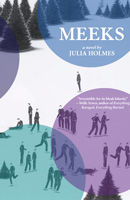

Small Beer Press, paperback, 9781931520652
Rolling Stone editor Julia Holmes's first novel, Meeks, owes a lot to Shirley Jackson's "The Lottery," the classic 1948 short story which opens with a seemingly innocent town meeting in an unspecified time and place, and gradually increases the reader's sense of foreboding until the very end when somebody heaves a rock, "and then they were upon her." Shivers!
In Meeks, a happy time of courting and marriage in wherever/whenever the book takes place is undercut by a similar sense of foreboding. The happy scenes of the impending Independence Day holiday, which features a huge community (almost eucharistic) cake celebrating the heroics of Captain Meeks, founding father, is interspersed with scenes of sickly, unhappy men who live in dank rooms, and vistas of sheds with women's names painted on them and wound round with chains.
Marriageable men and women seek each other out in a pretty park, but bad things happen to bachelors who can't find wives; the ubiquitous Brothers of Mercy see to that. And equally bad things happen to women who don't want to marry. The nation is also at war with an unseen enemy that one suspects doesn't exist, but serves to fuel the cult of founding father Captain Meeks, celebrated on Independence Day, which culminates in a "Lottery"-like ritual.
Some of the elements in Meeks seem a bit worn from having been recycled in myriad earlier dystopian landscapes. What is fresh and interesting about Holmes's book is the imagery, which revolves largely around food and clothing—the Independence Day cake, the intricate cookies potential wives serve up on plates like promises of sweets to come, family picnics on gay colored blankets, the pale courting suits of the bachelors, the autumn-colored sweaters of the successful husbands and fathers, the black jackets of the policemen, the gray smocks of the civil servants. All these things symbolize success or failure, power or weakness, in Holmes's world.
Where Meeks owes most to "The Lottery" is in its genre bending and its thematic ambiguity. Both stories look and act like dystopian novels. But both fail to operate as clear cautionary tales or social criticism in the same way classic dystopians do.
That hasn't stopped critics from trying to wring a dystopian message out of "The Lottery" for several decades. Some have interpreted it as a tragedy borne of clinging mindlessly to tradition. Or the human ability to rationalize away individual responsibility when sins are committed collectively. Or the essentially violent nature of man. Or even (in the 1970s and '80s) the expendability of women in society. Shirley Jackson claimed that "The Lottery" was just a horror story she imagined one day while pushing the baby in the stroller.
Most of the same critical interpretations above could be applied to Meeks (sans, one presumes, baby and stroller, though one ought never underestimate the dark thoughts of infant-pushing mothers!). Holmes allows the reader to flounder in a landscape where the people seem familiar but the rules are only partly understood. As in "The Lottery," the reader remains a disoriented observer. Reading Meeks (or "The Lottery") is something like watching the attack scenes in Hitchcock's "The Birds" or "Psycho," in which the camera is constantly changing angles, never pulling back far enough for the viewer to take in the whole picture. A reader of Holmes or Jackson knows what is happening, but cannot make out why or how, and therein lies some of the terror.
Ultimately, it's hard to pin down exactly what Meeks really means. It's for the reader to decide whether this is
a kind of genius—it could mean lots of things!—or whether the writer became so engrossed in the landscape
that she forgot to make it signify much of anything.
